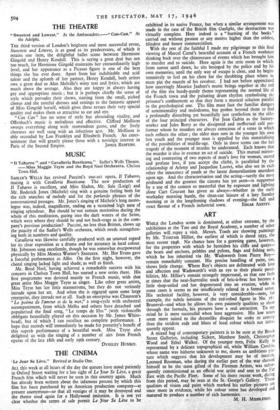THE CINEMA
Le Jour Se Leve." Revived at Studio One.
ALL this week at all hcurs of the day the queues have stood patiently in Oxford Street waiting for a last sight of Le lour Se Leve, a great French film which will never be seen in this country again. Much has already been written about the infamous process by which this film has been purchased by an American production company—at present anonymous—so that all vestiges of it may be destroyed and the theme used again for a Hollywood imitation. It is not yet clear whether the terms of sale permit Le Jour Se Le-ve to be exhibited in its native France, but when a similar arrangement was made in the case of the British film Gaslight, the destruction was
virtually complete. Here indeed is a " burning of the books" carried out without passion or any motive higher than the coldest, blindest and basest commercialism.
With the rest of the faithful I made my pilgrimage to this final viewing of Marcel Carnes beautiful account of a French workman thinking back over the chiaroscuro of events which has brought him to murder and to suicide. Here again is the attic room in which. from sunset until dawn, he sits besieged by the police and by his own memories, until the only way of escape is clear, and he begins tentatively to feel on his chest for the throbbing place where ht must pin the muzzle of his revolver. I had not before appreciated how unerringly Maurice Jaubert's music brings together at the end of the film the hurdy-gurdy theme representing the normal life of the French town and the pulsating drum rhythm symbolising the prisoner's confinement so that they form a musical solution parallel to the psychological one. The film must face the familiar dangers of sentimentality and melodrama, but probes beyond them to find a profoundly disturbing yet beautifully just symbolism in the roles of the four principal characters. For Jean Gabin as the factory- worker and Jules Berry as the dissipated and ineffectual café per- former whom he murders are always conscious of a sense in which each reflects the other ; the older man sees in the younger his own lost youth and the younger man is appalled by this materialising of the possibilities of middle-age. Only in these terms can the fuil tragedy of the moment of murder be understood. Each knows that the murder is•also in essence an act of suicide. This mutual mirror- ing and contrasting of two aspects of man's love for woman, sacred and profane love, if you accept the cliché, is paralleled by the relationship of Arletty and Jacqueline Lauret, who also see in each other the innocence of youth or the latent demoralisation attendant upon age. And the characterisation and the acting—surely the most profound and the greatest the cinema has yet tseen—is supported by a use of the camera so masterful that by exposure and lighting alone Curt Courant has given us always—whether in the early workaday morning bustle, the clean-cut leisure of a lazy Sunday morning or in the lengthening shadows of evening—the full and
exact flavour of a French industrial town. EDGAR ANSTEY.






























 Previous page
Previous page